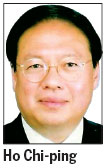Sino-US tie hinges on California summit
Updated: 2013-06-06 07:32
By Ho Chi-ping(HK Edition)
|
|||||||||
Like 1 billion-plus other Chinese and 300 million Americans, I am looking forward with considerable anticipation to the two-day California summit later this week (Friday and Saturday) between President Xi Jinping and US President Barack Obama.
I am confident that Xi will take every opportunity to portray China as a sincere, peace-loving country determined to share more equally its new-found wealth among its hard-working people, while unstintingly offering help and guidance to underdeveloped countries wanting to replicate our economic "miracle". He is also very likely to tell his host that China deserves its place as one of the world's great powers, and has long accepted the international responsibilities that go with such a role.
It is also to be hoped that China and the US will move upward to a new, friendlier and more positive plane in their bilateral relationship, putting behind them their present posturing that has elements of mutual distrust, if not (in the US's case) a stance that borders on the combative.

Both still in their 50s but wise beyond their years, the two leaders will not miss this opportunity to hold frank and wide-ranging discussions in accord with the relaxed atmosphere of what has been billed as an informal affair aimed at "progress not protocol". It has even been suggested that this informal atmosphere will extend to the leaders' apparel, with both donning open-neck shirts with the sleeves rolled up ready for productive exchanges, which would certainly be a welcome change from the stuffy norm of international summits.
If indeed both men agree to such a laid-back, hail-fellow-well-met setting, then perhaps they could take the next step by tearing away the cloak of diplomatic double-talk and really getting down to the nitty gritty. Such frank exchanges with each other concerning the most important issues affecting the relationship between the two countries might well lead to important differences being thrashed out, and hopefully solved.
Now let us look at some of the thorniest of these differences China could raise with the US. The most obvious of these is why the US has decided to "pivot" its naval, air and ground forces to its network of bases in Japan, Taiwan and South Korea - a move rightfully seen by Beijing as an effort to "contain" China's own growing military forces, which heretofore have not ventured beyond China's territorial waters and airspace. In contrast, Xi can suggest that logically US forces should be based on American soil. Meanwhile, the more recent conciliatory tone adopted by Washington, calling it a "re-balance", borders on the ludicrous.
Then there is another fresh US initiative that can only be construed as an effort to undermine China's influence with its Asian neighbors, particularly the avuncular role Washington plays with the Association of Southeast Asian Nations (ASEAN). In Singapore last week US Defense Secretary Chuck Hagel offered to hold a meeting later this year in Brunei with Southeast Asian defence ministers, to be followed next year by a higher profile conference with the 10 ASEAN leaders in Hawaii. Hagel said: "I believe this first-ever US-hosted meeting ... will provide another opportunity for us to discuss a shared vision for a dynamic, peaceful and secure future for the region."
But here's the rub behind the US's attempt to get involved in ASEAN's affairs: Four of its 10 members - Vietnam, Malaysia, the Philippines and Brunei - are now involved in territorial disputes with China. What could Washington contribute to the current situation apart from uncalled for meddling and interference? And who, except Washington, decided to appoint the US as Asia's "policeman", and commit so much of its military strength to the region? Did the US learn nothing from its disastrous military interventions in Korea (1950-53, 33,700 US deaths), Vietnam (1963-73, 50,000 deaths), or more recently Iraq and Afghanistan (over 6,500 and counting)?
Meanwhile respected Asian observer Ralph Cossa devoted his last radio program to an analysis on whether the California summit would lead to "cooperation or confrontation". As the president of the Pacific Forum Center for Strategic and International Studies in Hawaii, an independent think tank founded in 1975, Cossa believes Obama will be forthright with his counterpart about what the US sees as massive breaches of its cyber security by China - an accusation Beijing strongly rebuts, while complaining about American hacking of its communications.
Panelists on the program had a novel suggestion - the two leaders should agree on some "ground rules" for spying on each other electronically. They suggested that seeking intelligence about military and political matters should remain "fair game" for both sides, but that neither side should continue to conduct economic surveillance, and particularly not against individual companies. Pardon me, Mr Cossa, but I don't think that's going to happen!
The author is vice-chairman and secretary-general of the China Energy Fund Committee, an independent Chinese think tank on energy and China-related issues.
(HK Edition 06/06/2013 page1)